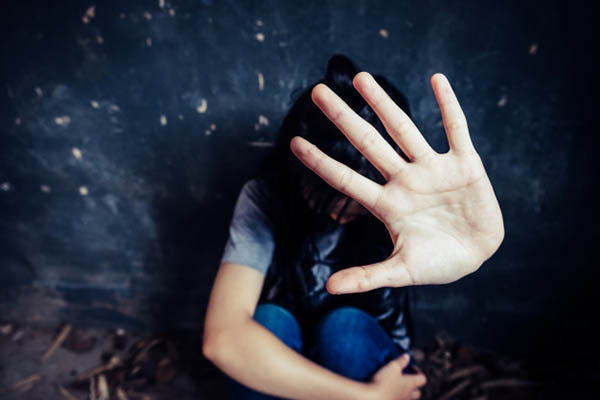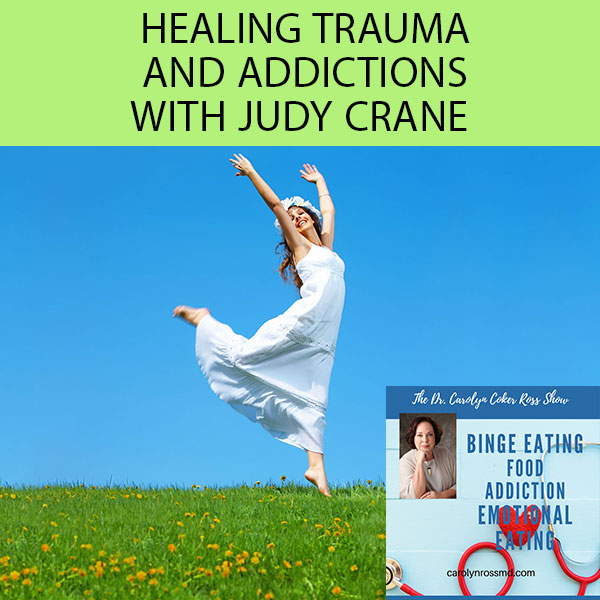
—
Listen to the podcast here:
Healing Trauma And Addictions with Judy Crane
My special guest is Judy Crane and our topic is healing trauma and addictions. Judy Crane is a friend and a specialist with many years of experience working in both residential and outpatient treatment centers. In 2003, she brought her years of specialized training and her distinctive insights on treating trauma and addiction to create The Refuge – A Healing Place, which is a residential treatment center in Florida. Under her leadership, The Refuge has grown to become one of the most well-known leaders in treating trauma, PTSD and addiction. Judy earned her Bachelor’s at Rutgers and Master’s from New York Institute of Technology. She’s a Certified Addiction Professional in Florida, Certified Sex Addiction Therapist, Certified Hypnotist and the list goes on. You can see that she is a specialist in this area. Welcome to the show, Judy.
Thank you so much. I’ve been looking forward to this.
I hope this isn’t too elementary, but I wanted to start with a simple question. Many of my clients, who I treat with trauma, often feel that their experience isn’t bad enough to qualify them for being told that they have trauma. How do you define what is trauma?
The simplest and most basic answer to that question is trauma is anything that’s less than nurturing. Sharon White has said that definition. I believe in what she’s saying. The biggest, most intense trauma that anybody can experience is neglect and abandonment. In spite of all the other things that can happen, all the terrible events, neglect, and abandonment probably create a bigger hole in the soul than almost anything else. If we start there and we can see that, all of those pieces that diminish who we believe we are or who we could be are considered trauma. Most of us have experienced some level of trauma.
Do different people react to the same traumas differently?
Absolutely. There’s a level of resilience that is created. There’s this simple thing that happens to someone who has been in a trauma. If some other human being comes up and offers them love, support, connection, touch, kind words that create an opportunity to build resilience. Even if it’s a little seed of resilience and people can build on that. If someone is experiencing that alone, in solitude, in loneliness, without kind words, without support, chances are if that happens over and over again to them, then their level of resilience is much less. Consequently, as things start happening to them, the layer after layer of trauma is created. It’s about that piece of attachment that we have to experience as human beings.
[bctt tweet=”Trauma is anything that’s less than nurturing.” username=”CarolynCRossMD”]I’m thinking about in my own family with my sisters who are much younger than I am. I had a pretty intact nurturing family when I was coming up and their experience of the family is quite different. In that case, someone who maybe had a nurturing childhood and then experienced trauma later in life has more ability to deal with the trauma in a less destructive way. Is that what you’re saying?
That’s exactly the case. The firstborn is new and exciting. The parents have more time to spend with that child. It’s still new so there is a lot of attention given to that child. Sometimes we might see that first born has more resilience because of that. As more children come along, there’s less ability for the parent to be available. I don’t know that that’s across the board, but that’s one of the examples that we could point out.
Are there other characteristics in ourselves or in the type of trauma we experienced that could predict how well we’ll deal with trauma?
When we see babies as they’re coming into the world, we can see that there’s a certain kind of personality to some babies. Some babies seem happier, more upbeat, more in tune with being in the world. There are some babies that are uncomfortable and maybe have some health issues. Generally speaking, the babies that have that ability to find a place of happiness and joy are going to be much more resilient. Whether that’s an innate piece for every human being or not, that would be difficult to say except there is that piece. Some of us are born with the ability to be more resilient.
What about other factors in us such as there may be a genetic risk for depression or anxiety, do those affect our ability to manage when we have a traumatic experience?
Not just the genetic piece of it, but also family history. If we’re coming into a family that’s already been experiencing loss and grief and we come into that place, we’re taking on the generational traumas. We may not even know what’s going on, but we’re experiencing sometimes guilt and shame and pain and remorse that probably don’t belong to us. As we’re born into that family, we’re kicking on the ghosts of the generations’ past.

Healing Trauma: All of us are just born with the ability to be more resilient.
I’ve had a number of patients with severe eating disorders who come from families that had a trauma during the Holocaust. It wouldn’t have been in their generation, but maybe their grandmother or grandparents or great aunts or uncles, etc. Is that the kind of trauma that you’re talking about is generational?
Absolutely. I have found working with children of Holocaust survivors that it’s much more difficult to help them to find that place. That it’s not theirs to bear because there’s that innate guilt. The other piece that happens is when we’re working with folks here. We may find that our client is having sexual abuse issues. When we bring the family in and we do the family work with everyone together, we find that the family is telling us finally that they had experienced the same thing. There is that shadow of generational sexual abuse that our clients didn’t even know existed but it was there in the family. It’s like the ghost of the past affect us even without us knowing exactly what it is.
There’s something that’s different in those families than in families that haven’t experienced any trauma in the past.
There’s energy. There’s a way of coping and dealing that’s different from folks and families that have not experienced it.
Another factor is does the age of the child have anything to do with their later ability to deal with trauma? Some kids are even abused when they were pre-verbal or if they were young or adolescent, do those ages tell us anything about how they might deal with trauma?
The younger the trauma, the more difficult it is. If it’s pre-verbal, it becomes extremely difficult because we’re operating from a place where we’re trying to help our client to understand and make a different story about what happened, to find some purpose. If they don’t even have words for what happened to them at that point, the memory is difficult for the mind to grab hold of. The earlier the trauma, the more difficult it is to heal. It takes a lot more work.
[bctt tweet=”The younger the trauma, the more difficult it is.” username=”CarolynCRossMD”]Someone who may have been traumatized when they were pre-verbal, how would you even know that trauma happened?
I started doing this work in a university. We’ll have folks that will come in and say they have all the signs and symptoms of sexual abuse, all the signs and symptoms of post-traumatic stress disorder. They feel it, they experienced it and the way they describe it is, “I can’t explain it, it’s yuck.” To me, that’s very clear when that comes up that there’s something pre-verbal because that’s exactly what happens. They have no word for it. The client is telling you, “I have no word for it.”
What about when trauma happens in the teenage years because there’s so much going on in those years. There’s the development of sexual behaviors, normal sexuality comes up, brain growth. If trauma in adolescence has any special signs or symptoms?
Our folks often get very quiet around what happened. They don’t usually tell what happened as teenagers, but the behavior changes. You can start to see where addiction takes hold. All of a sudden they’re experimenting. They drop out of their peer group and pick up with other friends, other people who understand them. They become angry and sometimes depressed. Those behaviors are a clear indication that something is wrong. When folks come here and all of a sudden they’re telling us their life history and they say, “When I was twelve, I had to go on this medication and I went to see a psychiatrist,” and then I say, “What was going on?” “I was acting out. My parents got upset.” I said, “Tell me what happened when you were twelve.” Often that’s the first time anybody asked them, including the parent. I can’t tell you how often someone will say to me, “That’s when I was abused by the camp counselor.” “Did you ever tell anyone?” “No.” The behavior is what’s being medicated as opposed to determining what event created the behavior. For a long time, that’s where we have failed our adolescent, that we’re not asking, “What is creating that behavior for you?” because there is something.
That’s an important point especially for parents who may be reading. In 2017, I had a male patient who had a serious suicide attempt. When I asked him when he first started being depressed, he said, “Fifteen.” I did the same thing you did. I said, “What happened at age fifteen?” No one for many years had asked him that despite severe depression, addiction, multiple suicide attempts and he had been a victim of trauma. That’s important for parents to think about when children start acting out. Is it them being a teenager or has something happened?
I wanted to look at the spectrum of signs and symptoms that parents can look for. You talked a little bit about teenagers. How they don’t necessarily talk about trauma and the signs there would be the beginning of addictions, changing peer groups, emotional raging or anger. What about for younger children? What are the things that adults can look forward to noticing if trauma is affecting their lives?

Healing Trauma: We can intervene on traumas if we can pay attention to those signs and symptoms.
If we’re looking at younger children, it’s some of the same pieces. If a child has been a wonderful child and all of a sudden he or she is acting out in great anger and throwing tantrums, there’s something wrong. If they are staring out into space, we call that dissociating. If they are getting very quiet when they wouldn’t normally be quiet. If they have the signs of depression, they don’t want to play or don’t want to watch television or be a part of, that’s something to look into.
Sometimes they also have changes in their eating, don’t they?
Changes in eating, changes in sleeping patterns and that’s across the board for all humans that are experiencing trauma. Those signs and symptoms are universal but maybe experienced a little differently by each age group. It’s important for us to pay attention to what’s going on with our little ones. We can intervene in the effects of traumas if we can pay attention to those signs and symptoms that something’s going on. The difficulty with adolescents is they are also experiencing hormone changes and the ordinary pieces that go along with becoming adolescent. We have to be more alert to that, to what is going on. One of the other things that we can start paying attention to when we talk about changing eating habits is this is when eating disorders come into play. This is when self-harming behaviors come into play. With self-harming behaviors, it can be complicated because our children start hiding that. We may not know they’re doing it. They’ll be wearing long sleeve. They’ll be covering up places where they have cut or burnt. Those are some of the signs and symptoms that there’s something else going on.
If we stick with the idea of children, how a parent who might suspect their children has been hurt or abused or even bullied because bullying can be traumatic too.
That’s a huge trauma. I had a wonderful experience with one of our alumni. We were doing some additional couples work and she had been in treatment for a few months in 2017. A lot of that was with us two different times. She had to leave her four daughters. Her five-year-old daughter was upset when she had to come back down for a short period of time and she was acting. She was raging and being angry. We had taught our alumni how to handle this, she sat her down and she said, “I have a feeling that you’re angry at me. It’s okay for you to tell me that you’re angry. I want to know what’s going on and how can I help you?” Simple conversation. Her daughter was able to say, “Mommy, I am angry at you because you were gone and now you’re here and I’m afraid for you to go for two days.” They made a little contract that the two of them would call during the whole two days and they would talk and that she would be back at a certain time. She was able to say, “I’m not angry. I’m sad but it feels like I’m angry. I don’t know what to do with it.” Simply being able to give our children permission it’s okay to talk to us. Many of our children are afraid that our reactions will be anger or that we will go and hurt somebody else for hurting them. They guard us against our own feelings and then take it on themselves. It’s about having the conversation.
It seems that many parents are afraid if they say that they expect their child has been harmed or they intuitively have a sense that something happened. It seems many parents are afraid to ask, “Did anyone touch you inappropriately?” Is there a good way to delve into that if you’re a parent?
[bctt tweet=”So many of our children are afraid that our reactions will be anger that they guard us from their own feelings and take it on themselves.” username=”CarolynCRossMD”]The simplest way is being able to find a safe environment, a comfortable place, a place where the child feels comfortable. Set the mood that you’re talking about something else that’s safe. Talk about, “I’ve been worried about you. I’m concerned. This is what I’m seeing and this isn’t normally how you are. I’m wondering if this is because something else has happened. Did somebody hurt you? Has somebody hurt your feelings? Is somebody bullying you?” Open the door to give that child an opportunity. It’s frightening to do. There are a lot of therapists who are afraid to do that because they’re afraid that it’s going to open something up that they’re not going to be able to deal with. I can promise this that what our folks need is someone to listen and love them and to witness for them. Not to blame them and not to show that anger about what happened. Many children are afraid if something sexual happened that dad’s going to go out and kill him. They take that on and they keep the silence for that reason.
Many times they’ve been threatened by a perpetrator, “If you tell, I will do such and such.”
We have to let them know that no matter what was said, no matter how, “It’s okay. I can handle this. I will help you.”
When we talk about the signs of trauma in adults, many times it seems that adults don’t connect. That their sex addiction or their chemical dependency or their eating disorder or gambling may have its root in trauma. Is that what your experience has been?
That’s exactly what my experience is. It’s what pulled me into the field of trauma because I have been active in the addiction field. It was clear I would see this entire relapse happening all the time and couldn’t understand what was going on. What was going on is people even when they got sober, other things would pop up like a Whac-A-Mole game. They might get sober but all of a sudden there’s sexual acting out happening or they were gambling or the eating disorder. If there’s a core issue like trauma, then ultimately a human being has to find a way to soothe themselves and we soothe with these behaviors because at the moment it feels good. It takes us away from the internal feelings that have been disturbing. We will find over and over again that people who are struggling with eating disorders and sex addiction, self-harming behaviors and gambling as well as addiction, that there are core issues there. There almost always are, I would say 99% of those are about trauma.
Few of the patients I treat with addictions or eating disorders connect that to their trauma. It’s almost like the trauma is something that happened in the past and they don’t see that link between them. I’m not quite sure why that is. Do you have a theory about why we don’t connect trauma to these behaviors?

Healing Trauma: Sometimes, the addiction has saved that young person in the midst of some trauma. It’s given them a place to hide.
I don’t know why we don’t connect that. That’s probably one of the most important things we do is to connect the dots for our folks. When we get them involved in doing a timeline or a trauma egg, we can clearly take them back to the first time that they purged or became anorexic. It’s like a template, “This happened and so I purged and I got relief or this happened and I masturbated and got relief. This happened and I cut and I got relief.” We don’t think about that when we’re in the process of those behaviors, but when we can take them back in a timeline it becomes like an a-ha moment for our clients, that’s when they finally make the connection. They make the connection and then they can see the pattern and how that’s happened throughout their life, how that’s worked for them. I always say that people who have the gene for addiction that for a while are fortunate because they have this ability to soothe themselves for a period of time from the trauma. I know that sounds wacky, but the reality is sometimes the addiction has saved that young person in the midst of some trauma. It’s given them a place to hide. It always turns on us however, but we as human beings are going to find a way to soothe ourselves. That’s our role, that’s our job is to self-soothe. Our job as clinicians is to help our folks to find healthy ways to self-soothe and that’s a process.
Maybe having an addiction also gives them time to mature in some ways so that they are able to handle dealing with the trauma. Many of my clients when they were traumatized they were young, they didn’t have any other way to take care of themselves other than using food or alcohol if they’re a teenager. That seems to be another aspect. Working through your trauma is not an easy process. I wonder if you can share some of the benefits of your experience of what it takes to deal with a past trauma.
I can tell you that number one, it takes a long time. That our 28-day programs don’t work. It’s insufficient. I know a longer term and treatment, 90 days a minimum in a residential setting for folks where there are multiple modalities and good clinicians who understand trauma. A lot of clinicians do not and to be fair, they choose not to operate with trauma. Having folks who understand trauma and have a lot of skill sets is important to find a safe and nurturing environment. A place where they can find comfort and trust in the people that are there where they can find compassion and care and that’s important for healing trauma. There are tremendous modalities that are our folks. It’s imperative to find the right place, the right clinician and the right length of stay for you.
I’d like to get more of the benefit of your experience on what trauma resolution looks like.
Folks want to know, “What’s going to happen here and why do I have to be in treatment for such a long time? Why is this intense?” Ultimately, what trauma resolution looks like is it’s changing the way we perceive what happened. Most of our folks come in and they have been victims and have taken on that energy of being a victim. Our job is to help them to find purpose in their life. To know that in spite of what happened, that believe it or not there are real blessings that have come from that event. How have you become a better person? How has it changed the way you look at the world? Can you look at the world in a more positive way as a result? Is there somebody that you can help? Like getting sober and clean in addiction, you find a purpose in your life. It is the same way with trauma resolution. I know when people are getting well. When you can see that shift in their attitude and their mood and you can see that it no longer takes their breath away when they talk about the trauma.
I call that finding your hook back into life. It’s interesting that you see that in trauma work because that’s what I see a lot in my work with eating disorder patients. When they start talking about getting back into life and what they want to do and love for their families, you can see that they’re turning the corner. That’s not overnight. Before that, there is a lot of other stuff that happens.
[bctt tweet=”What our folks need is someone to listen, love them, and really be witness a for them; not to blame them.” username=”CarolynCRossMD”]A lot of other stuff, but that’s exactly it. That’s when you know as a clinician, you can feel that smile coming up on your face because it’s working. There are a lot of things that happened. Number one, trauma is visceral sensory cellular. It is in the cell level of our body. That’s how we experience it. We don’t experience it mentally or cognitively at all. We experience it by the energy in our body, the smells that we are taking in, the sounds, the taste and the feelings that happened. When we heal, we have to heal through the body first and ultimately our folks have to re-experience on some experiential level what happened to them.
Peter Levine does wonderful work with Somatic Experiencing. We’re asking them to help their body get through the trauma to the triumphant piece. We help our clients get to that place of triumph where they’ve fought back or they’ve found a way to escape, re-experience the trauma where they are the victors. We can help them do that in many ways. Telling the story the way it should have turned out, the way it could have turned out. We do a lot of things like Somatic Experience and the ropes course and equine therapy. We also do a lot of psychodramas, a lot of experiential pieces like artwork and we use music. Our clients begin to find joy in their life again, but they have to be able to identify the trauma, tell the story again and it loses its energy. For most of our folks, they’ve never told the story until they get here. That’s part of that whole piece of being able to become the victor in your own story.
Do you have to forgive what happened or forgive the person who hurt you in order to resolve trauma?
No, you don’t. What has to happen is you have to be able to forgive yourself. Most of our trauma survivors, in spite of the fact there were perpetrators involved. The biggest struggle for them is that they blame themselves. They almost always blame themselves even when they know logically and cognitively that’s not the truth. In their soul, they believe that they’re responsible, that forgiveness has to come from their heart. One of the things I do is I ask them to bring in pictures of themselves when they were little and when they look at that picture and I say to them, “You were three when that happened, that’s three. Can you see that three in the picture? Should that child have been guilty of what happened to them?” You can see the change in their face because it finally makes sense and the relief of being able to let go of their own guilt and shame around what happened because it wasn’t theirs to own.
Even if you were thirteen, you were still thirteen, not 33 or 23.
Victor Frankl says that what has to happen for survivors is they have to come to a place where they recognize there’s nothing that they can change about this event. There is nothing that can be changed. It happened, it was there. There’s nothing that they can do about it. The only thing that can change is our attitude about it and where we find purpose and meaning for our life. That’s what trauma resolution is.

Healing Trauma: You have to be able to forgive yourself.
The Buddhist calls that radical acceptance. It seems many people who have experienced trauma keep reliving it thinking, “If only I had, I should have, I could have,” and they keep trying to fix something that can’t be fixed.
That shift in perception in the Big Book and in Twelve-Step philosophy, Chuck C said, “We need a new pair of glasses.” It’s that simple. We need a new pair of glasses. We need to look at this in a different way. When that happens, the relief, the body changes. You could just see that change in our folks. What happens is many of them decide, “I want to help other people who have been through what I’ve been through.”
We’ve been talking a lot about the victims of trauma. I wonder if you could say a little bit about how families are affected or family members of the person who was victimized are affected.
We do a lot of intense family work. Our families come and they are experiencing post-traumatic stress disorder almost at the same level as the clients they’re bringing in. Their powerlessness over the events that the family hasn’t been able to do anything about it or change anything about it, but they’re there witnessing the experiences of their loved one. They’ve walked with them through drug addiction and eating disorders and self-harming behaviors. When they come here with their family members, they’re terrified and lost and hopeless and thinking, “Please, one more time. I need the answer. Tell us how to get our family back.” It’s painful to watch how the families had been affected and we talk to them. They call and tell them that they need as much help as their loved one does. They do. The family needs to be able to be heard as well.
That’s counterintuitive because many people would think, “It didn’t happen to me. It happened to my daughter or my husband or my wife. Why should I put the focus on me, that’s selfish?” Why is that family work important?
For our client to get well, the whole family has to change. In the midst of all of this, it’s incredible to watch but sometimes their families get sicker. They get sicker as a result of the addict in the family, whatever the addiction is. They start to lose their perspective on their own life. They almost become like hostages in a situation that is essentially not of their own making, but because of their loving care for their loved one, they’re trapped in that cycle. Many times by the time they come to us, the whole family has become very sick and mashed or alienated. They have to be able to change their perspective of what happened as well. I can tell you that if they don’t, it doesn’t bode well for our clients. Usually, our clients find that they have to remove themselves from their family for a period of time or find some space unless the family does their own work as well.
[bctt tweet=”Trauma is visceral.” username=”CarolynCRossMD”]I wonder if you could tell us a little bit about the process of trauma resolution for the families.
One of the things we are doing here at The Refuge, which it became an absolute necessity. We would have our folks come for a family week and the work was intense. One of the things that the families would say to their loved one is, “Here you are. You’re here for 90 days being surrounded by love and care and yes, you’re doing a lot of hard work. There you are, what about me?” The families have a right to say that. We started doing a five-day intensive and they’re very intense and they go from morning to about 7:00 or 8:00 at night. In five days, the families do their own work. They do their own work from when they first were born and what happened to them and how that affected the way they operate in life. Families that do that come together much better with the folks that are already in treatment. The truth is trauma is generational and the way we cope with trauma is generational. We need the opportunity to help the families to heal as well. There might be one person in the family that is most affected or appears most affected or who is acting out the most, but the whole family has been incredibly affected. If the family is willing to do this work, amazing things happen.
We’ve been talking a lot about the process of trauma treatment. What should someone do if they think they need trauma treatment?
You can always call us and we’ll help to direct you. People are so internet savvy now. I would invite folks to go online and look up what trauma treatment there is in the country. It’s limited. There are some folks who know how to do it but to research. The other piece is how do you know what kind of treatment do you need? If you’re functioning and doing okay in your job but having an overall feeling of unease and uncomfortability, then you might need for a period of time to see a therapist who deals with trauma and to do that work. Unfortunately, that 55-minute hour is not ideal and it’s difficult to open someone up and then be able to send them on their way in 55 minutes.
That’s one of the reasons intensives are good and I can tell you that there are many places in the country who do those five or six-day intensives and I would invite you to go online. There are places like Onsite and Caron Foundation and our facility. Those five-day intensives will give you an idea if you’re in a place where five days a couple times a year might work for you and help you to get through some trauma resolution, but still to function in your world if you’re functioning. Folks who come to us, generally speaking, are people who have been chronically relapsing, have been in treatment a couple of times and that’s not working. It’s not working because no one’s testing them around the trauma. The folks that come to us are discovering that they can’t even operate in the world for whatever reason.
Those are the ones who need residential treatment.

Healing Trauma: Trauma creates addiction and trauma creates disorders.
They need residential treatment because for whatever reason they’re not functioning. Their addictions are taking over. For some of our folks that come here, there’s not even what looks like an obvious addiction, but anxiety and depression are overwhelming them to the place where they can no longer work or they can’t function in their family. Those are good signs of trauma.
Many people who have had trauma have severe depression and even suicide attempts.
A good thing to recognize is that generally speaking they’re trauma-driven. There is some organic and clinical depression, but so often and I’m finding that more and more when you’re asking someone, “When was the first time you got depressed? When was that overtaking you?” You can take them back to a period of time in an event, the same thing with anxiety and if that’s the case and they’re not functioning and that happens to us a lot. We have people who have come here that have been CEOs of big companies, but their life has fallen apart and need to be in treatment, in inpatient. You can measure it there. What I recommend is come and see us for an intensive and we’ll be able to evaluate what would be worthwhile. There’s a wonderful site on the internet, it’s IITAP. It’s a site for sex addiction therapists, but all of those therapists are also well-versed in trauma treatment. That’s a place where you can go to find therapists.
Why is there that connection between sex addiction and trauma?
It’s because trauma creates sex addiction and trauma creates eating disorders. Folks who understand eating disorders usually understand trauma. Folks who understand sex addiction understand trauma. Unfortunately, in the field of substance abuse, that’s not the case. It is becoming more and more the case that people are learning and understanding that trauma can be a core piece of addiction. I think because addiction is genetic that people believe, “That can’t correlate,” but it does.
In integrative medicine, we believe that you can turn your genes on or off, not always under your control but it may be that trauma clicks on the addiction gene.
[bctt tweet=”Forgiveness has to come from your own heart.” username=”CarolynCRossMD”]I believe that as well. If you need some help and you need some direction and you’re not getting it out there, feel free to call our admissions office. That’s not about coming to The Refuge, that’s about us being able to direct you to a place that might be near you or would be more appropriate. We do that every day. We filled a ton of phone calls where we can direct people to the right place. We’d be happy to do that. Families get lost in the mix and they don’t know what to do or how to do it. We need to be able to go to the experts to find out what’s right.
How has trauma treatment changed over the two decades that you’ve been doing this work?
In the ‘70s and ‘80s, therapists understood this. We talked about the core issues and we have some wonderful people in our field who were doing this work in the ‘70s and ‘80s. Unfortunately, healthcare had created this terrible vacuum where it needed to be about addiction and it needs to be 28 days. All of those pieces were insurance-driven and so people were no longer allowed to go into that work because it was driven by insurance. You wouldn’t get paid if you’re doing that work. It got lost for a while and that’s dramatically how it changed. These past many years we’re looking at it again because it’s where people were falling through the cracks. We at The Refuge, we’re one of the first extended care residential treatment centers to do trauma. We have grown and developed and honed our skills and as a result, I don’t say this with any arrogance or ego, there are a lot of other programs that are beginning to do the kinds of things that we do which have proven to work. Like you, the integrative health system is what works.
I know you worked daily with individuals who have had serious and depressing experiences in their lives. How do you keep your spirits up?
I’m a voracious reader of thrillers. I do that, it takes me away. We are very clear with our therapists here that they have to take care of themselves. We offer yoga and massage for our therapists. I give them a lot of vacation time because it’s imperative to prevent burnout. These stories are overwhelming and I have staff who are so committed to our clients they overwork themselves. I do those things for myself. I make sure that I go away on vacation to an island by myself where nobody knows what I do. I lie in the sun and get well and then I come back and I’m all rejuvenated. I make sure I do some good things for myself.
It’s hard to heal others if you’re burned out. It doesn’t seem like we’re focusing much on that in other treatment areas like addiction counselors often get burned out. I know eating disorder counselors do as well.
It’s unfortunate because I know that when you’re doing this work and then you go home to your own family. You’ve heard these horrendous stories and your little boy comes up to say, “Joey bullied me.” The immediate response in your brain is that’s the worst that happens to you, but that’s not fair and it’s not okay. We have to be able to take care of ourselves so we don’t neglect our own.
It has been such pleasure having you on the show. I want to remind people that if you want more information or you need help finding trauma treatment, you can turn to The Refuge – A Healing Place at www.TheRefuge-AHealingPlace.com. Judy, can you give the phone number that they would call?
352-288-3333.
I want to thank you, Judy, for being on the show and giving us such great information. I also thank our readers of the blog.
Important Links:
- Judy Crane
- The Refuge – A Healing Place
- Peter Levine
- Big Book
- Onsite
- Caron Foundation
- IITAP
- www.TheRefuge-AHealingPlace.com
About Judy Crane
 When I was little, my refuge was on a rock on the banks of Cooper River near my house in southern New Jersey. I had big dreams but life and circumstances took me on a different much harder path. I was a child of the ’60s, it was sex, drugs, and rock and roll, the Vietnam War, civil rights, and rebellion in the streets.
When I was little, my refuge was on a rock on the banks of Cooper River near my house in southern New Jersey. I had big dreams but life and circumstances took me on a different much harder path. I was a child of the ’60s, it was sex, drugs, and rock and roll, the Vietnam War, civil rights, and rebellion in the streets.
My primary purpose through the ’60s, ’70s, and ’80s was my addiction. It consumed me. My husband was my partner in crime, he died of this disease at age 35. I was a widow at 27. I was left with 3 children. I continued to use, I just could not beat it, my children suffered and I still could not stop. By the grace of God, I finally became sober in 1987. Since that moment, my life has been incredible and all of my children are in recovery of some sort.
I realized at some point during my recovery that not only did I need 12 steps, but I had to heal my lifetime of emotional traumas. I went back to school and started working in the addiction field. I discovered most chronic relapsers struggled with other issues and usually those issues have to do with emotional traumas and PTSD.
A series of miraculous events took place along with a lot of hard work, and The Refuge – A Healing Place was created. My dream came true. There was finally a place for emotional trauma survivors to heal! As founder and former CEO of The Refuge – A Healing Place, I trained the greatest staff of clinicians. We trained the greatest staff from the kitchen staff to the house managers. I taught them how to love and nurture our clients, and sometimes lovingly kick their asses. Our clients worked so hard, they went into the black hole and with our help came out the other side.
After 10 years of running The Refuge, I was ready to step back and work on my next project – Spirit2Spirit. We now teach other clinicians how to work with emotional trauma survivors. This module base course results in clinicians coming away with a (CTT) Certified Trauma Therapist Certification.
I currently teach, speak, and do therapy all over the world. My concierge therapy allows me to travel to my clients or have them come to me if they wish.
I am so blessed to be in this new phase in my life, and to be able to continue to help others heal. I hope you continue to heal on your journey.








